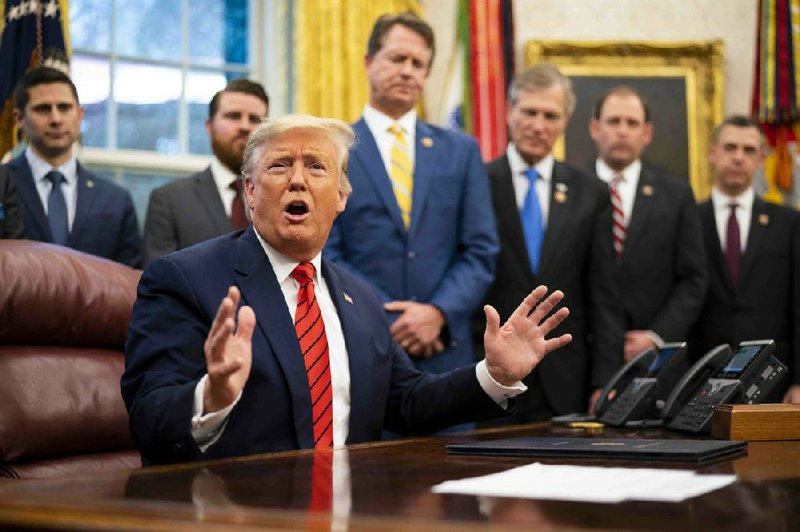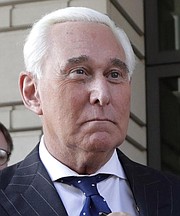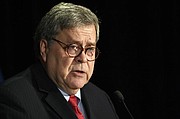WASHINGTON -- All four career prosecutors handling the case against Roger Stone, a confidant of President Donald Trump, asked to withdraw from the legal proceedings Tuesday -- and one quit his job entirely -- after the Justice Department signaled that it planned to reduce their sentencing recommendation.
Jonathan Kravis, one of the prosecutors, wrote in a court filing that he had resigned as an assistant U.S. attorney, leaving the government altogether. Three others -- Aaron Zelinsky, Adam Jed and Michael Marando -- asked for a judge's permission to leave the case.
Zelinsky, who was a member of former special counsel Robert Mueller's team, also indicated in a filing that he was leaving his special assignment to the U.S. attorney's office for the District of Columbia, though a spokeswoman said he will remain an assistant U.S. attorney in Baltimore.
None provided a reason for their decisions.
[Gallery not loading above? Click here for more photos » arkansasonline.com/212stone/]
Those decisions came hours after a senior Justice Department official told reporters that the agency's leadership had been "shocked" by the seven- to nine-year penalty that prosecutors asked a judge to impose on Stone, adding that the department intended to ask for a lesser penalty.
"That recommendation is not what had been briefed to the department," the official said, speaking on the condition of anonymity to discuss a sensitive case. "The department finds the recommendation extreme and excessive and disproportionate to Stone's offenses."
Later Tuesday, the department filed an updated sentencing recommendation asserting that the initial guidance "could be considered excessive and unwarranted under the circumstances." The memorandum was signed by interim U.S. Attorney Timothy Shea and his criminal division supervisor, John Crabb.
None of the four career attorneys who signed the first memo affixed their names to the second.
[Video not showing up above? Click here to watch » https://www.youtube.com/watch?v=Fx46F0pM_J4]
"Ultimately, the government defers to the Court as to what specific sentence is appropriate under the facts and circumstances of this case," Shea and Crabb wrote.
Shea took over as the interim U.S. attorney in Washington last month.
Through a spokeswoman, Zelinsky declined to comment. Jed also declined to comment. Kravis and Marando could not immediately be reached.
Returning from a campaign rally in New Hampshire and a trip to Delaware to honor two U.S. soldiers recently killed in Afghanistan, the president tweeted in support of Stone and criticized Monday's sentencing recommendation as a "miscarriage of justice!"
"This is a horrible and very unfair situation," Trump tweeted.
He did not say whether that meant he might pardon Stone, something Trump had previously indicated he would not rule out.
"The real crimes were on the other side, as nothing happens to them," Trump wrote.
Kerri Kupec, a Justice Department spokeswoman, said the White House did not communicate with the agency on Monday or Tuesday and that the decision to reverse course was made before Trump's tweet.
Stone was convicted by a jury in November of obstructing Congress and witness tampering. His was the last conviction secured by Mueller as part of the investigation of Russian interference in the 2016 election.
AGENCY CRITICIZED
Meanwhile, Democrats decried the agency's decision, with Senate Minority Leader Charles Schumer calling for an investigation by the Justice Department's inspector general.
House Intelligence Committee Chairman Adam Schiff said it would be a blatant abuse of power if Justice Department leadership intervened on Trump's behalf.
"Doing so would send an unmistakable message that President Trump will protect those who lie to Congress to cover up his own misconduct, and that the Attorney General will join him in that effort," the California Democrat said.
David Laufman, a former Justice Department official, called it a "shocking, cram-down political intervention" in the criminal justice process.
"We are now truly at a break-glass-in-case-of-fire moment for the Justice Dept.," he wrote on Twitter.
Rep. Bill Pascrell, D-N.J., said the move amounted to "obstruction of justice."
"We are seeing a full-frontal assault on the rule of law in America," Pascrell said. "Direct political interference in our justice system is a hallmark of a banana republic. Despite whatever Trump, [U.S. Attorney General] William Barr and their helpers think, the United States is a nation of laws and not an authoritarian's paradise."
It was not clear what was told to Barr or other Justice Department leaders about the final recommendation. The senior official said they were led to believe it would be lighter than what was ultimately filed by the prosecutors. But some legal observers were skeptical.
Mary McCord, a former prosecutor and acting assistant attorney general for the department's National Security Division, said decisions related to the sentencing of such high-profile political figures would not be made without initial consultation between a U.S. attorney's office and Justice Department headquarters, and that it was hard to imagine that the department was truly taken aback.
"There is no way you can come away from this with anything other than an impression that Justice is taking its orders from the president and pandering to the president," said McCord, who was also chief of the criminal division at the U.S. attorney's office in Washington. "This is causing lasting and long-term damage to the department's reputation and credibility."
In the initial 22-page sentencing recommendation, prosecutors Marando, Jed, Kravis and Zelinsky wrote that a sentence of 87 to 108 months "consistent with the applicable advisory Guidelines would accurately reflect the seriousness of [Stone's] crimes and promote respect for the law."
Kravis and Marando were part of the U.S. attorney's office in Washington. Jed and Zelinsky were members of Mueller's team on special assignment to the office. Kravis and Zelinsky revealed the resignations in formal requests to withdraw from the Stone case, which still must be approved by a judge. Jed and Marando asked to withdraw but gave no immediate indication that they were resigning from their positions.
Crabb, the head of the Washington office's criminal division and also a career prosecutor, entered the case in their place.
SENTENCING FORMULAS
Stone's attorneys are pushing for probation, and they have pointed to his age, 67, and lack of criminal history as reasons the longer sentence is excessive. They also noted that of the seven Mueller-investigation defendants who have been sentenced, only one faces more than a six-month term: 70-year-old former Trump campaign chairman Paul Manafort, who is serving 7½ years.
Given the hardships and loss of professional standing suffered by Stone and his family, "No one could seriously contend that a [reduced ...] sentence would cause anyone to walk away from these proceedings believing that one can commit the offenses at issue here with impunity," defense attorneys Bruce Rogow, Robert Buschel and Grant Smith wrote.
Federal prison sentences are calculated using mathematical formulas. While prosecutors and defense lawyers make recommendations based on their calculations, ultimately it is up to the judge to decide which factors to consider in sentencing someone, and whether to adhere to the recommendation or depart from it.
In Stone's case, the prosecutors came up with a recommendation of seven to nine years based on a number of aggravating factors, including an alleged threat to harm a witness -- to whom Stone sent the message, "prepare to die" -- and because prosecutors decided Stone's conduct resulted in "substantial interference in the administration of justice."
Under the federal sentencing guidelines' point system, those factors add years to Stone's prospective prison sentence. Stone and the witness in question, Randy Credico, both have maintained that Stone's statement was not a threat of violence, but rather was part of Stone's history of making bombastic statements.
In their Monday filing, prosecutors argued that more time should be added to Stone's sentence because of his extensive criminal conduct, which stretched two years, and because they say he obstructed the prosecution of the case after he was charged.
In a Tuesday filing from Shea and Crabb, the government argued that those enhancements were overkill, noting that Stone's victim has asked for leniency for him and did not view the statement as an actual threat. The new filing also contended that the enhancements endorsed in the previous government filing were not in keeping with the sentences generally doled out to nonviolent offenders.
Tuesday's filing suggested -- but does not outright recommend -- that a sentence of three to four years would be reasonable and "more in line with the typical sentences imposed in obstruction cases."
REVISION FOR FLYNN
Prosecutors in another case brought by the special counsel's office, against former Trump national security adviser Michael Flynn, also recently walked back a sentencing recommendation.
In early January, prosecutors recommended that Flynn, who pleaded guilty to lying to the FBI about his contacts with Russia's ambassador to the U.S., be sentenced "within the Guidelines range" of zero to six months in prison. But in another filing just weeks later, they made clear that they agreed with Flynn "that a sentence of probation is reasonable."
Prosecutors did not explain in the later filing why they emphasized probation as a reasonable sentence for Flynn. Both documents were signed by career prosecutors -- Brandon Van Grack and Jocelyn Ballantine -- though Van Grack has not signed some later filings in the case. Flynn is now seeking to withdraw his guilty plea, alleging government misconduct.
Barr has been critical of the FBI's 2016 investigation into Trump's campaign, an inquiry that Mueller ultimately took over. When the Justice Department inspector general found last year that the bureau had adequate cause to open the case, Barr issued a public statement registering his disagreement. He said the case was initiated "on the thinnest of suspicions that, in my view, were insufficient to justify the steps taken."
"It is also clear that, from its inception, the evidence produced by the investigation was consistently exculpatory," he added.
Barr tasked the U.S. attorney in Connecticut with exploring the origins of the case.
Information for this article was contributed by Matt Zapotosky, Devlin Barrett, Ann E. Marimow, Spencer S. Hsu and Timothy Bella of The Washington Post; and by Michael Balsamo, Eric Tucker, Jill Colvin and Kevin Freking of The Associated Press.
A Section on 02/12/2020


